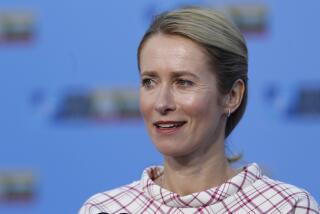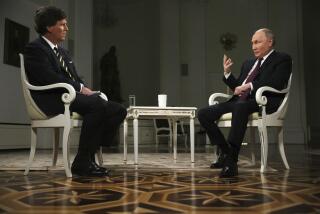Russian leaders seek to revisit history as tension with U.S. grows
A leading Russian elected official on Thursday called for an investigation of the United States’ atomic bombings of Hiroshima and Nagasaki during World War II as a “crime against humanity.”
The effort to reconsider history by Sergei Naryshkin, the parliament’s lower house speaker, comes on the heels of two similar calls by colleagues earlier in the week to revisit significant events involving Russia during the 20th century.
On Wednesday, lawmaker Frants Klintsevich of the ruling United Russia faction called upon his colleagues to reconsider and even annul a 1989 statement of the then-Soviet Union’s Congress of People’s Deputies denouncing its military invasion in Afghanistan that had gone on for 10 years and led to the deaths of about 15,000 Soviet servicemen and hundreds of thousands of Afghans.
Earlier in the week, upper house speaker Valentina Matviyenko sought to officially void the 1954 handover of Crimea from the Russian Federation to the then-Soviet republic of Ukraine. That action was in effect annulled in March when Russian President Vladimir Putin announced the annexation of Crimea after a referendum whose fairness was questioned by many analysts.
The revisionist efforts come at a time when relations between Putin and the West are growing increasingly frosty as the former Cold War rivals escalate their rhetoric and actions over the fate of Russian neighbor Ukraine. Critics warn that efforts by the Kremlin to rewrite history were a hallmark of the Soviet communist era of totalitarian rule.
The late Soviet leader Josef “Stalin was very good at rewriting contemporary history, but even he never abolished any of the decrees issued by Emperor Nicolas II,” Gleb Pavlovsky, president of the Efficient Policy Foundation, a Moscow think tank and a former Kremlin advisor, said.
The 1945 nuclear bombings of the two Japanese cities days before the end of World War II were similar to Nazi crimes, Naryshkin argued at a history science conference in Moscow on Thursday.
“I think that we should discuss this topic together with lawyers and international law experts because crimes against humanity have no limitation period,” Naryshkin said, according to the Itar-Tass news service.
“As we well know, the bombings of the two peaceful Japanese cities could not be explained from a military point of view,” Naryshkin said. “The atomic bombings … were solely an intimidation demonstration resulting in the deaths of hundreds of thousands of peaceful residents.”
A day earlier, Klintsevich contended that the Congress’ decision in 1989 to denounce the Soviet military intervention in Afghanistan had “nothing to do with historical truth.”
The vote, promoted by a democratic faction that included the future Russian President Boris Yeltsin, determined that a 1979 decision by Leonid Brezhnev’s Communist Party Politburo to deploy troops in neighboring Afghanistan was a political mistake which “deserved moral and political condemnation.”
Klintsevich argued that the 1989 vote was itself politically motivated.
“We had managed to slow down the spreading of the terrorist plague clad in Islamic clothes across the world,” Klintsevich told reporters in parliament. “It can be said that we took the initial blow upon ourselves, and the war in Afghanistan gave the world community a certain break which unfortunately was not taken advantage of for a number of reasons.”
On Tuesday, Matviyenko declared that it had been illegitimate for then-Soviet Communist Party leader Nikita Khrushchev to hand over Crimea to Ukraine.
Russia annexed Crimea in March following the referendum that took place after thousands of Russian troops in unmarked uniforms had taken over strategic sites across the peninsula. In a March 18 speech, Putin praised the “historic reunification” and in his Dec. 4 state of the union address said Crimea will remain Russian forever.
On Thursday, Putin announced the cancellation of a long-standing Russian tradition, a prolonged New Year’s holiday, for an undisclosed number of officials, explaining that “people have a right to take a rest but we can’t allow such long vacations for the government.”
Political analyst Andrei Piontkovsky denounced this week’s looks at history as “delirious ravings aimed to distract the people’s attention from their daily economic woes connected with the falling ruble and Western sanctions.”
“The Soviet invasion in Afghanistan was exactly the factor which caused the initial spreading of Islamic fundamentalist extremism across the world,” said Piontkovsky, a senior researcher at the Academy of Sciences’ System Analysis Institute. “In their zeal to condemn the United States and the West in general for anything they can and the way they are going now, the next call would be to denounce the 1945 Dresden bombing as a crime against humanity.”
Pavlovsky said the statements are examples of people “intoxicated by their own propaganda which has nothing or little in common with the real picture of the world or its history.”
More to Read
Start your day right
Sign up for Essential California for news, features and recommendations from the L.A. Times and beyond in your inbox six days a week.
You may occasionally receive promotional content from the Los Angeles Times.






